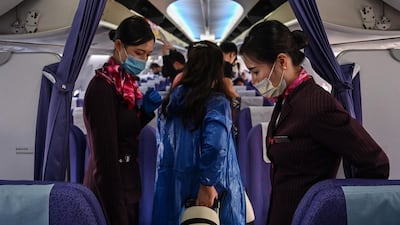Face masks bought to protect people against the spread of coronavirus could do more harm than good, health authorities have warned.
The spread of Covid-19 has led to a global run on face masks, including in the UAE.
Much of the panic buying has focused on N95 masks, which are worn by doctors due to their ability to filter out 95 per cent of small particles.
“N95 masks are only meant to be used by medical staff working in entities treating coronavirus patients," said Dr Adil Al Sajwani, a family medicine specialist and Ministry of Health and Prevention official, in a video on Twitter.
“Use of these masks by the general public may impose pressure on the user's respiratory system and may cause respiratory diseases among its users. The use of these masks is also strictly forbidden for children.”
Medical professionals frequently change their masks, most of which are designed to be worn for a few hours at most and these are not recommended for the general public.
“If the public wear face masks, they run the risk of infecting themselves with flu because every time you touch an infected surface and then you touch the mask, which is on your face, you increase the chances of infecting yourself. Most people do not know how to wear the mask properly and not everybody is aware of it,” said Dr Hend Al Awadhi, head of health promotion and education section at the Dubai Health Authority’s Public Health Protection Department.
Instead of wearing a face mask, Dr Al Awadhi said that it is better to wash your hands thoroughly for at least 20 seconds and avoid close contact with anyone showing the symptoms.
“If you don’t have access to soap and water, use a hand sanitiser. If you greet someone with respiratory symptoms do not touch their hands or hug the person.
“People at a higher risk of contracting the disease, are those who have been in contact with a person who is confirmed to have Covid-19 or those who have travelled to certain countries where there has been a significant outbreak.
“People who have been in contact with a confirmed case or those who have flu-like symptoms after travel to such countries in the last 14 days much be seen by a healthcare provider to rule out Covid-19. Additionally, UAE airports are following all the necessary screening protocols. All healthcare providers in the UAE are well aware of the processes to follow and are receiving regular updates from the relevant health authorities. The system is streamlined and unified,” she said.
The common flu and coronavirus have similar symptoms like fever, sore throat, cough, body aches and difficulty in breathing. The incubation period for the virus is two to 14 days.
“People at a risk of developing severe symptoms are those with chronic medical conditions or elderly. Both flu and Covid-19 can spread from person to person through droplets from an infected person by coughing or sneezing or by direct contact.
“Cover your mouth when you sneeze or cough, correct disposal of tissues; hand-hygiene is particularly important. I also find that people who are sick often go to work despite being sick with a flu; they should stay at home and go back to work after they have recovered. Of course, if they are people with risk factors that I mentioned, they must definitely get themselves screened immediately,” said Dr Al Awadhi.
The DHA expert clarified that there is “only supportive treatment for the disease that helps control the symptoms such as fever and cold. Recovery of the patient depends on the patient’s immune system and the medical care provided. In most cases, patients recover once the body overcomes the virus.”
People with any query on coronavirus can call the DHA call centre on 800342, Estijaba service at the operation centre, Department of Health on 8001717 or the Ministry of Health & Prevention on 80011111.
The warning comes after the United States’ surgeon general, Jerome M Adams, urged the public to stop buying masks.
He wrote on Twitter: “They are NOT effective in preventing general public from catching #Coronavirus, but if health care providers can’t get them to care for sick patients, it puts them and our communities at risk!”
The best defence against the virus is thorough hand washing and following basic hygiene standards.
The US marked its first death as a result of the virus on Saturday.
There were almost 87,000 coronavirus cases globally as of Sunday, about 7,200 of which were outside of mainland China.


